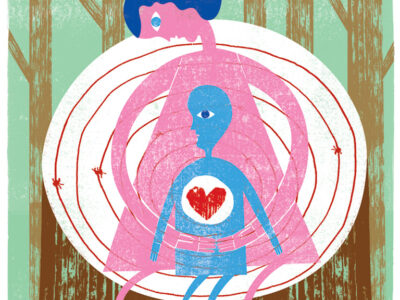
The annual Dean’s Forum lecture was delivered in March by Dr. Paul Farmer, a medical anthropologist and physician whose public-health initiatives in Haiti were documented in Tracy Kidder’s 2003 best-seller, Mountains Beyond Mountains: Healing the World: The Quest of Dr. Paul Farmer. Farmer has won wide acclaim for fighting the HIV/AIDS epidemic in Haiti and Rwanda, and is the founder of Partners in Health (PIH), a group dedicated to improving the lives of poor people by providing access to comprehensive health care. In 1998 PIH launched the HIV Equity Initiative to provide free antiretroviral therapy to poor AIDS patients in Haiti, employing community health workers to play a key role in coordinating treatment. This model, which involved rebuilding public hospitals, attracted criticism in some policy circles on the grounds that it was not cost-effective.
Farmer used his talk to question the “religion of cost-effectiveness” and argue for a more holistic approach to global health problems:
“In the mid-’90s … we started fighting for access to care. There’s only one standard of care, only one intervention that’s going to alter mortality in HIV infection, and that’s these drugs. And it was a long struggle. It was a huge debate. Our peers—policymakers, international health experts, even physicians, I’m a little embarrassed to say—were saying, ‘Well is it really cost-effective or sustainable to use these drugs in resource-poor settings?’ …
“By the way, patients never say that. I still have yet to meet someone who would say, ‘Well, what a shame I have AIDS, but as I’m a rural Haitian woman, it’s not cost-effective to treat me.’ So that’s all us.
“[The Clinton Foundation] … found that community health workers [accounted for] 4 percent of the total cost, 9 percent of the labor cost. So if you want to use the term cost-effectiveness, which I do, it’s about as cost-effective as you can get. But remember, this is not about HIV or TB or malaria. It’s about all of it. So to rebuild these hospitals … labor is the biggest expenditure. And if you go into an area where unemployment is 60 percent, are you embarrassed to spend 45 percent of your budget on labor? I’m not. I think it’s good. And if you go into a place where there’s a lot of hunger—happily, medical science, through revolutionary breakthroughs, has given us a treatment for hunger called food. And spending 19 or 20 percent of your budget on food is not an embarrassment, either.” —T.P.




